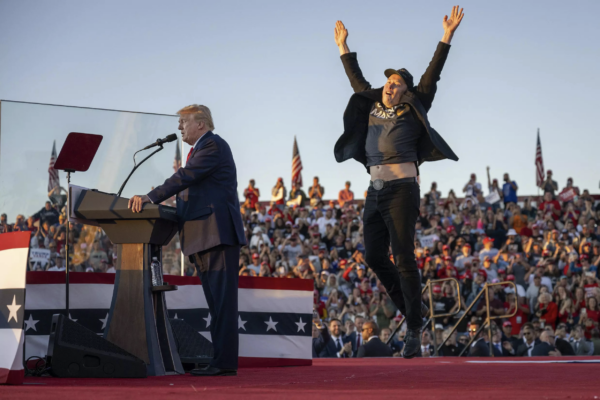One hundred years ago, a massive scandal over energy issues exposed the corrupt presidency of Warren G. Harding, discrediting his Republican administration and leading to convictions and the resignation of key Cabinet members and other top officials.
A U.S. Senate investigation found that Interior Secretary Albert Fall (yes, the “Fall Guy”) and other Harding cronies had profited from the leasing of a U.S. Petroleum Reserve named Teapot Dome, establishing the authority of Congress to perform oversight investigations of the executive branch and leaving a doomed Harding presidency under a cloud of corruption.
A similar but potentially even more profound energy scandal is now unfolding under President-elect Donald Trump.
Elon Musk is using his influence to push for abolishing existing electric vehicle tax credits for consumers and other electric vehicle policies, an action that Musk admitted “helps Tesla,” his own company, since key competitors like GM and Ford are less established in producing and marketing electric vehicles but have made large investments.
Ironically, killing the tax credits would run directly counter to the central goals Trump claims he wants to achieve. Trump has run his campaign on bolstering U.S. domestic manufacturing, but eliminating the EV tax credit would punish U.S. auto workers and car companies, strangling a key new domestic manufacturing growth sector.
And of course, Trump famously claims he wants to punish China. But eliminating the electric vehicle credit would directly benefit China, by sidelining its U.S. competitors.
China has used large subsidies to control three-quarters of the global lithium-ion electric battery market and two-thirds of the global EV market, in part because Trump refused to help the U.S. EV manufacturing sector from 2017 to 2021. The EV tax credits, passed into law by a Democratic Congress in 2022 at President Biden’s urging, were an attempt to help America outcompete China in this key manufacturing sector.
As Energy Secretary Jennifer Granholm, who has been the forefront of U.S. clean energy, noted, “‘You eliminate these credits, and what do you do?’ she said. ‘You end up ceding the territory to other countries, particularly China.’”
Biting the hand that fed him
But the ironies are thicker and more bitter than that.
Musk owes much of his success to a $465 million loan from the Department of Energy in 2010 under the Obama administration. Yet since getting that government help, Musk has opened a huge new factory in — you guessed it — China, which now produces half of Telsa’s vehicles. Indeed, many Tesla EV models do not qualify for the tax credits because, in a nod to American manufacturing, Democrats insisted that qualifying vehicles be free of Chinese-made components.
So Musk used massive U.S. government loans to save Tesla when it needed money to keep from going under, then moved much of Tesla’s production to America’s primary competitor, and now is attempting to kill EV consumer incentives to hurt companies like GM and Ford who build their cars in the U.S.
So much for America First!
But don’t worry about Elon; according to the Economist magazine, the total value of Musk’s businesses has skyrocketed 50 percent — to $1.4 trillion — since he allied with Trump, “as investors bet that Musk will be able to extract exceptional rents from his friendship with the [new] president.”
Congress should reject this self-dealing by Musk and focus instead on helping American manufacturers.
In August, 18 House Republicans sent a letter to House Speaker Mike Johnson urging him not to repeal clean energy tax incentives. Moreover, major U.S. automakers have already invested billions of dollars in retooling their factories toward electric vehicles, in Michigan, Ohio and other key industrial states. Now, the auto industry has begun fighting back. Ford, General Motors and Stellantis are strategizing with other car manufacturers on how to save the tax credit, and perhaps even Environmental Protection Agency rules that effectively require greater production of electric vehicles.
Elon Musk, the world’s richest man, got that way in part due to federal government help. But after backing Trump, he has again changed his tune. “Take away the subsidies,” he wrote on X, which he also owns. “It will only help Tesla. Remove subsidies from all industries!”
Back in 1920s, Congress began a series of investigations into the Teapot Dome scandal led by Sen. Robert La Follette (R-Wis.) that exposed widespread patterns of corruption by the so-called “Ohio Gang” of Harding associates and government officials. Albert Fall was indicted, convicted and imprisoned for his role in the Teapot Dome and other oil scandals, becoming the first member of a president’s Cabinet to be convicted of a felony while in office. The director of the Veteran’s Bureau was subsequently indicted and convicted of bribery in operating the agency. Another key figure in the administration committed suicide in the dwelling of the attorney general, who was himself indicted. Harding died in office in 1923, probably of a heart attack, just as the scandals began to reach the public and tarnish his reputation.
Today, 100 years later, the richest man in the world, who helped bankroll Trump’s presidential campaign and who benefits from billions of dollars in federal contracts for SpaceX, is using that influence to undercut U.S. competitiveness in the key emerging manufacturing sector of electric vehicles. Right now, it’s average autoworkers, American car companies, consumers, and U.S. climate protection on one side — and Elon Musk and Donald Trump on the other. Which side will Congress take?
Paul Bledsoe is a professorial lecturer at American University Center for Environmental Policy. He served as a staff member in the U.S. House, Senate, Interior Department and the White House Climate Change Task Force under President Clinton.
The Hill

